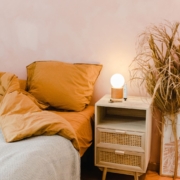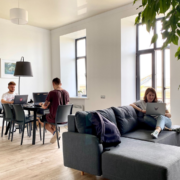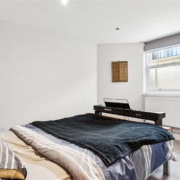Green Practices Flatsharing: How Flatsharing Embraces Sustainability
With growing environmental concerns, Green Practices flatsharing has made sustainable living a priority for many individuals. They aim to reduce their carbon footprint and adopt eco-friendly practices. Flatsharing, a housing concept emphasising community living, aligns perfectly with sustainability principles. In this blog, we will explore how flatsharing supports green practices, making it an ideal choice for those who wish to live in an environmentally conscious and socially responsible manner.
Shared Resources, Reduced Waste
One of the fundamental principles of flatsharing is the sharing of resources. Residents can pool their resources and reduce waste by living in a shared space. Shared kitchens, for example, allow for bulk purchases and reduced packaging, minimising single-use plastics and food waste. Similarly, shared utilities and appliances promote energy efficiency and lower overall consumption, leading to a smaller environmental footprint.
Energy Efficiency
Flatsharing spaces often implement energy-efficient practices, such as LED lighting, smart thermostats, and energy-conscious appliances. Additionally, residents are more likely to adopt sustainable habits when they see others doing the same. The collective effort to conserve energy contributes to a greener and more sustainable living environment.
Eco-Friendly Building Design
Many flatsharing spaces are designed with sustainability in mind. Some flatsharing communities utilise eco-friendly building materials, renewable energy sources, and efficient insulation to reduce energy consumption. Living in such spaces promotes sustainability and raises awareness of the positive impact of green building practices on the environment.
Community Gardens and Urban Farming
Flatsharing spaces often provide communal gardens or areas for urban farming. This enables residents to grow organic produce, fostering a connection with nature and reducing reliance on commercially grown and transported food. Community gardening encourages sustainable practices, such as composting and water conservation, and strengthens the sense of community among residents. An informative article titled “How to Grow Vegetables in Containers for a Plentiful Garden” can provide valuable insights for those looking to maximise their gardening efforts in such spaces. This article offers practical tips on cultivating a bountiful garden within containers. It makes an excellent resource for flatsharing residents aiming to make the most of their urban gardening endeavours.
Eco-Conscious Lifestyle Choices
Living in a flatsharing community surrounded by environmentally conscious individuals can influence residents to adopt eco-friendly lifestyles. Discussions and workshops on sustainable living, recycling initiatives, and responsible waste management are common in flatsharing spaces, encouraging residents to integrate green practices into their daily lives.
Reduced Carbon Footprint through Carpooling
Flatsharing spaces often attract individuals with similar lifestyles and locations of work or study. This similarity in daily routines provides an opportunity for carpooling, reducing the number of vehicles on the road and the carbon emissions associated with individual commuting.
Flatsharing presents an attractive option for those who wish to embrace sustainable living practices and positively impact the environment. By sharing resources, promoting energy efficiency, and adopting eco-friendly building designs, flatsharing communities create a sustainable living environment that benefits both the residents and the planet. Engaging in community gardening, encouraging eco-conscious lifestyle choices, and exploring carpooling opportunities further solidify flatsharing as a green and socially responsible housing solution. Embrace flatsharing as a pathway to sustainable living, and together, we can create a greener and more sustainable future for our communities and the world.
Contact us!

















